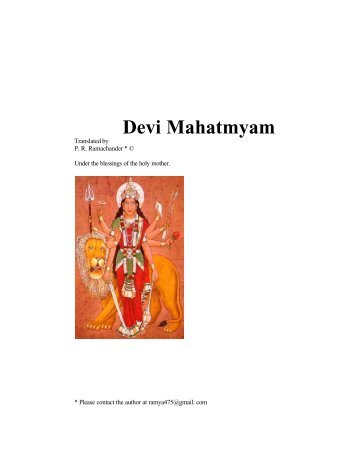Mariamman Thalattu Book
Hindupedia, the Hindu Encyclopedia, is devoted to educating the public about all aspects of Hinduism ranging from history and philosophy to current events that impact Hindus. We are the only online Hindu encyclopedia that provides the public with a traditional perspective on our religion and way of life. There are articles on Hindupedia. General Introduction • • • • • • • • • • • Shastra (Scripture & Literature) • • • • • • • Core Concepts • • • • • • • • • • • • • Individual and Social Life • • • • • • • • • • • • • Civilization • • • • • • • • Other • • • • •.

Anthony Dojoy is on Facebook. Join Facebook to connect with Anthony Dojoy and others you may know. Mariamman thalattu. Fuller House. Gurpreet Singh Sandhu. Worldstar Hip Hop, Make Money Online, Special Books by Special Kids, Russel Peters, Cole Sprouse, The Guyana Tamil Hindu. A Carnatic Music Community. Perumal Thalattu (Enadhu raagame unathu geethame.) Ragam: Madhyamavathi. ↳ CM Books ↳ Lyrics & Notation.
Mariamman Thalattu Book List
God Muniyappan Muniandi is a regional guardian deity. The deity Muniandi refers to the Munis worshipped by the Tamil people. Muni refers to a class of guardian deities which are classified as Siva Gana.

Mariamman Thalattu Mp3
They are servants of the Supreme God and his female half. The Munis could refer to former warriors, kings or sages who achieved the status of a Muni after their human death. Some of the Munis worshipped were created as Munis and did not go through the human life cycle. The Munis are worshipped as Guardian Deity (Kaval Deivam), Favourite Deity (Ishta Deivam) and Family Deity (Kula Deivam). Muniandi is also known as Muniappan, Aandiappan and Munisamy. Contents • • • • • • • • • • • Mentions in Kandar Shashti Kavasam [ ] There are mentions regarding Munis in the Kandha Shasti Kavasam. However Munis that were mentioned in the verses refer to types of evil spirits or ghost that is prevalent in the Tamil folk fore in contrast to the guardian deity.
The famous Kandar Shashti Kavasam by Devaraya Swamigal contains the following verses: paarka paarka paavam podipada billi soonyam perumpahai ahala valla bootham valaashtihap peihal allal paduthum adangaa muniyum pillaihal thinnum puzhakadai muniyum kollivaayp peihalum kuralaip peihalum penkalai thodarum bramaraa chatharum adiyanaik kandaal alari kalangida. Please see and see that my sins are powdered, Let the black magic and great enmity go away, Let great devils and those who shake their tails, Let the uncontrollable Muni, which creates problems, Let the back yard Muni which eats babies, Let the ghosts with fire in their mouth, Let the ghosts which steal my speech, And let the Brahma Rakshasas which follow ladies, Run away screaming when they see me.
Reference in Rig Veda [ ] According to Rig Veda, the Munis are trained in various magic arts and believed to be capable of supernatural feats. They were particularly associated with Rudra (Siva), a deity who is also connected with mountains and storms and more feared than loved. The following is based on the translation of the Rig Veda by in 1896, HYMN CXXXVI. HE with the long loose locks supports Agni, and moisture, heaven, and earth: He is all sky to look upon: he with long hair is called this light. 2 The Munis, girdled with the wind, wear garments soiled of yellow hue. They, following the wind's swift course go where the Gods have gone before. 3 Transported with our Munihood we have pressed on into the winds: You therefore, mortal men.
Mariamman Thalattu Mp3 Download
Behold our natural bodies and no more. 4 The Muni, made associate in the holy work of every God, Looking upon all varied forms flies through the region of the air. 5 The Steed of Vata, Vayu's friend, the Muni, by the Gods impelled, In both the oceans hath his home, in eastern and in western sea. 6 Treading the path of sylvan beasts, Gandharvas, and Apsarases, He with long locks, who knows the wish, is a sweet most delightful friend 7 Vayu hath churned for him: for him he poundeth things most hard to bend, When he with long loose locks hath drunk, with Rudra, water from the cup. Reference in Mariamman Thalattu [ ] Mariamman Thalattu is a lullaby dedicated to Goddess. There are some references to various deities in this lullaby. The following are the reference made to Vaal Muni and Sem Muni.
Vaal muniyum Sem muniyum vandu koluvirundar, Kathan karuppanodu kattazhagar veethu irundar, Thotiyathu chinnanum, durai magamum thaan irundhar, The Vaal muni and Sem muni came and sat with her, The Kattazhagar (handsome one) sat along with Kathan and Karuppan, The Chinnan of Thottiyam and Duraimagan (Son of the Landlord) sat with her, Meaning of Muniandi [ ] The word Muniandi is a combination of two words, Muni and Andi. The word Andi could be defined in two ways. One referring to slave of God and the other ruling (as in ruler).